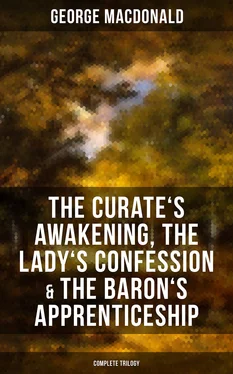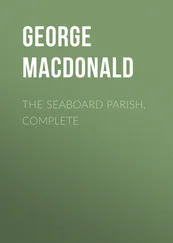"I don't believe," she went on, "that even Miss Lingard has more of the blessed sense of freedom and strength and motion when she is on horseback than I have when I am asleep. The very winds of my dreams will make me so unspeakabably happy that I wake weeping. Do not tell me it is gone then, for I continue so happy that I can hardly get to sleep again to hunt for more joy. Don't say it is an unreality—for where does freedom lie? In the body or in the mind? What does it matter whether my body be lying still or moving from one spot of space to another? What is the good of motion but to produce the feeling of freedom? The feeling is everything, and if I have it, that is all that I want. Bodily motion would indeed disturb it for me—lay fetters on my spirit.—Sometimes, again, I dream of a new flower—one never before beheld by mortal eye—with some strange, wonderful quality in it, perhaps, that makes it a treasure, like that flower of Milton's invention—haemony—in Comus, you know. But one curious thing is that that strange quality will never be recalled in waking hours; so that what it was I can never tell—as if it belonged to other regions than the life of this world: I retain only the vaguest memory of its power, and marvel, and preciousness.—Sometimes it is a little poem or a song I dream of, or some strange musical instrument, perhaps like one of those I have seen angels with in a photograph from an old picture. And somehow with the instrument always comes the knowledge of how to play upon it. So you see, sir, as it has pleased God to send me into the world as crooked as a crab, and nearly as lame as a seal, it has pleased him also to give me the health and riches of the night to strengthen me for the pains and poverties of the day.—You rejoice in a beautiful thought when it comes to you, Mr. Wingfold—do you not?"
"When it comes to me," answered Wingfold significantly—almost petulantly. Could it be that he envied the dwarf-girl?
"Then is the thought any worse because it comes in a shape?—or is the feeling less of a feeling that it is born in a dream?"
"I need no convincing, I admit all you say," returned Wingfold.
"Why are you so silent, then? You make me think you are objecting inside to everything I am saying," rejoined Rachel with a smile.
"Partly because I fear you are exciting yourself too much and will suffer in consequence," answered the curate, who had noted the rosy flush on her face.
The same moment her uncle re-entered the room.
"I have been trying to convince Mr. Wingfold that there MAY be some good in dreaming, uncle," she said.
"Successfully?" asked Polwarth.
"Unnecessarily," interjected Wingfold. "I required for conviction only the facts. Why should I suppose that, if there be a God, he is driven out of us by sleep?"
"It is an awful thing," said Polwarth, "to think—that this feeble individuality of ours, the offspring of God's individuality, should have some power, and even more will than power, to close its door against him, and keep house without him!"
"But what sort of a house?" murmured Wingfold.
"Yes, uncle," said Rachel; "but think how he keeps about us, haunting the doors and windows like the very wind, watching to get in! And sometimes he makes of himself a tempest, that both doors and windows fly open, and he enters in fear and dismay."
The prophetic in the uncle was the poetic in the niece.
"For you and me, uncle," she went on, "he made the doors and windows so rickety that they COULD not keep him out."
"Ye are the temples of the Holy Ghost," said the curate, almost unconsciously.
"Some of us a little ruinous!" rejoined the girl.
So full was her soul of a lively devotion that she took the liberties of a child of the house with sacred things.
"But, Mr. Wingfold," she continued. "I must tell you one more curious thing about my dreams: I NEVER dream of being crooked and dwarfish. I don't dream that I am straight either; I suppose I feel all right, and therefore never think about it. That makes me fancy my soul must be straight.—Don't you think so, sir?"
"Indeed I do," said Wingfold warmly.
"I'm afraid I shall be telling you some of my dreams some day."
"We are rather given to that weakness," said Polwarth,—"so much so as to make me fear for our brains sometimes. But a crooked rose-tree may yet bear a good rose."
"Ah! you are thinking of my poor father, uncle, I know," said Rachel. "His was a straight stem and a fine rose, only overblown, perhaps.—I don't think I need be much afraid of that, for if I were to go out of my mind, I should not have strength to live—unless indeed I knew God through all the madness. I think my father did in a way."
"It was quite plain he did," answered her uncle, "and that in no feeble way either.—Some day I must tell you,"—here he turned to Wingfold—"about that brother of mine, Rachel's father. I should even like to show you a manuscript he left behind him—surely one of the strangest ever written! It would be well worth printing if that would ensure its falling into the hands of those who could read through the madness.—But we have talked quite long enough for your head, child; I will take Mr. Wingfold into the next room."
CHAPTER VIII.
THE BUTTERFLY.
Table of Contents
As Wingfold walked home that afternoon, he thought much of what he had heard and seen. "If there be a God," he said to himself, "then all is well, for certainly he would not give being to such a woman, and then throw her aside as a failure, and forget her. It is strange to see, though, how he permits his work to be thwarted. To be the perfect God notwithstanding, he must be able to turn the very thwarting to higher furtherance. Don't we see something of the sort in life—the vigorous nursed by the arduous? Is it presumptuous to imagine God saying to Rachel: 'Trust me, and bear, and I will do better for thee than thou canst think?' Certainly the one who most needs the comfort of such a faith, in this case HAS it. I wish I could be as sure of him as Rachel Polwarth!—But then," he added, smiling to himself, "she has had her crooked spine to help her! It seems as if nothing less than the spiritual beholding of the Eternal will produce at least absolute belief. And till then what better or indeed other proof can the less receive of the presence of the greater than the expansion of its own being under the influences of that greater? But my plague now is that the ideas of religion are so grand, and the things all around it in life so common-place, that they give the lie to each other from morning to night—in my mind, I mean. Which is the true? a loving, caring father, or the grinding of cruel poverty and the naked exposure to heedless chance? How is it that, while the former seems the only right, reasonable, and all-sufficing thing, it should yet come more naturally to believe in the latter? And yet, when I think of it, I never did come closer to believing in the latter than is indicated by terror of its possible truth—so many things looked like it.—Then, what has nature in common with the Bible and its metaphysics?—There I am wrong—she has a thousand things. The very wind on my face seems to rouse me to fresh effort after a pure healthy life! Then there is the sunrise! There is the snowdrop in the snow! There is the butterfly! There is the rain of summer, and the clearing of the sky after a storm! There is the hen gathering her chickens under her wing!—I begin to doubt whether there be the common-place anywhere except in our own mistrusting nature, that will cast no care upon the Unseen. It is with me, in regard to my better life, as it was with the disciples in regard to their bodily life, when they were for the time rendered incapable of understanding the words of our Lord by having forgotten to take bread in the boat: they were so afraid of being hungry that they could think of nothing but bread."
Читать дальше












